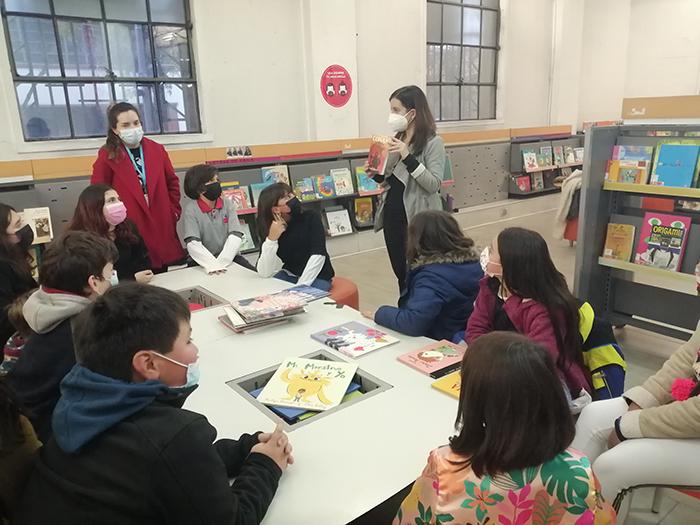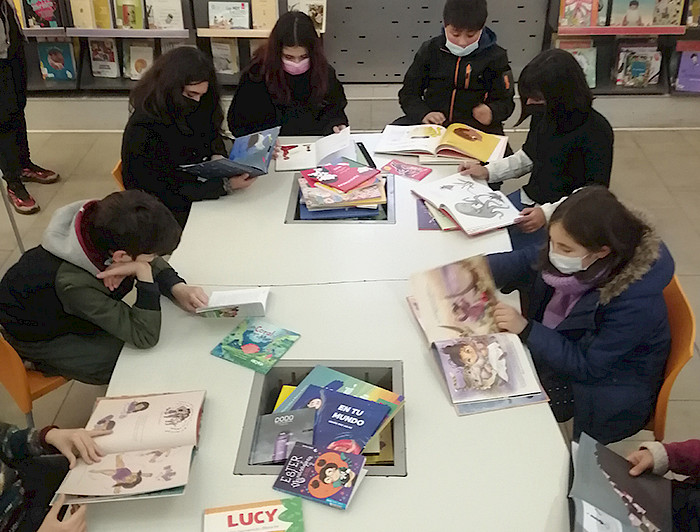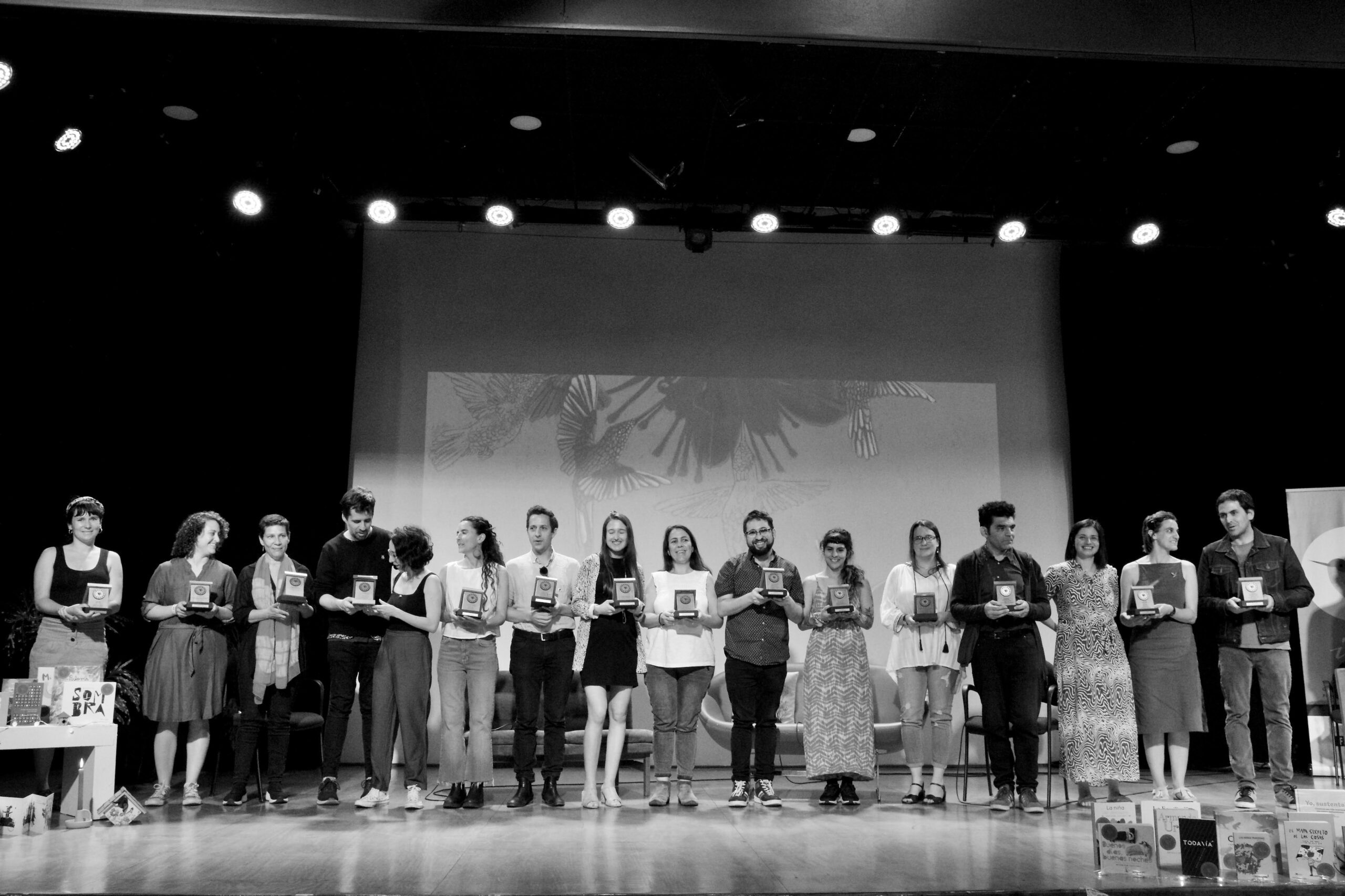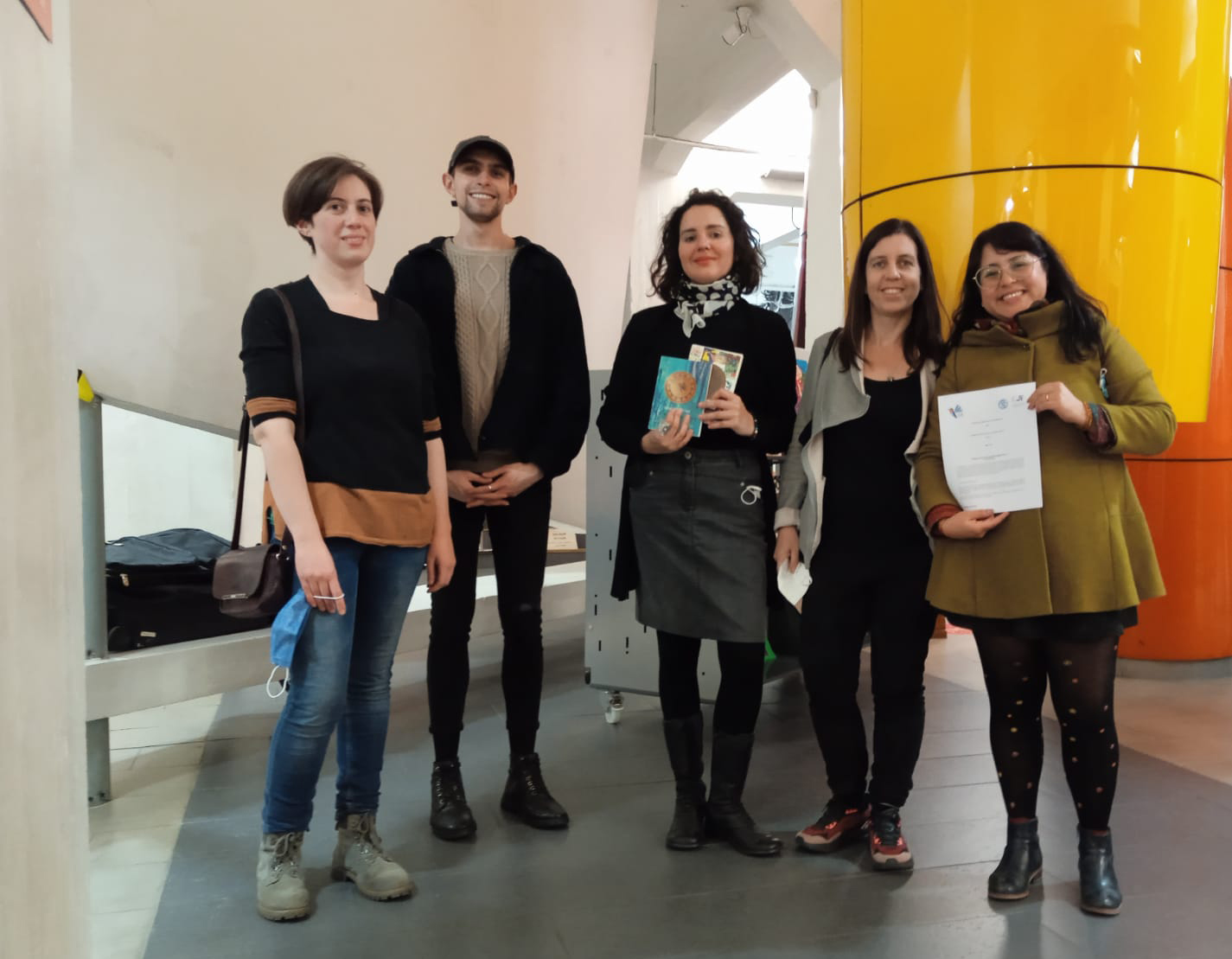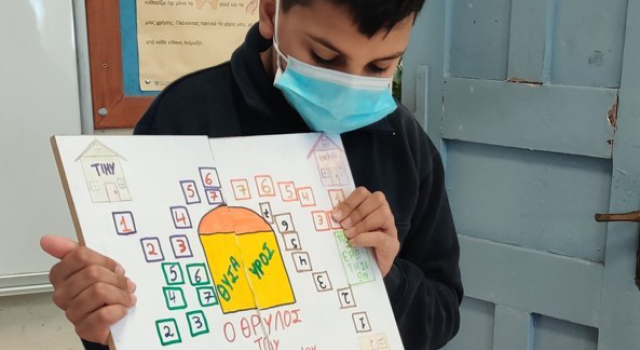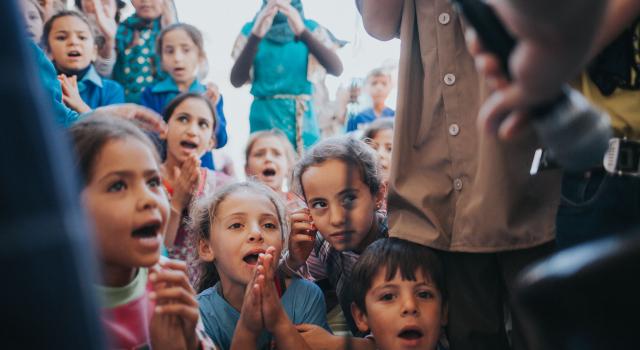IBBY project in the spotlight: #EstoTbn’s Children’s Jury in Chile
How can we encourage reading for pleasure in young people and adults? Many organizations have embarked on innovative projects that have contributed to promoting a reading culture. In this international series, we spotlight reading initiatives from around the world that can inspire reading promoters everywhere. This episode: the #EstoTbn-IBBY Children’s Jury in Chile.
by guest writer Yasmine Motawy
Inspired by scholarly activism
#EstoTbn is a collaborative platform in Chile for recommending children's literature. It began 2020 as a result of scholarly activism that took place during the pandemic. An interdisciplinary team of researchers - Macarena García-González, Ignacia Saona, and Soledad Véliz - began the platform as part of their ongoing research on cultural and literary mediation practices at the Center for Advanced Studies in Educational Justice of the Catholic University of Chile.
The hashtag #EstoTbn – short for ‘esto también’ – means “this also” in Spanish, and expresses the snowballing thread of suggestions that becomes possible when young people are given a space where they can make recommendations on books, art, and other media to their peers. The hashtag suggests that opening spaces of participation to young people may challenge adult-fed algorithms that tell children what to read next. The platform has flourished and expanded to house various recommendation-based activities such as fanzine workshops, an exhibition, the recording of a podcast, and a collaboration with IBBY to set up the first children’s jury for a literary prize in Chile.
Need for stories
We spoke to Macarena García-González, children’s literature scholar and principal researcher about how #EstoTbn came into being and what it involved, with a special focus on the children’s jury that came out of it. García-González shares how the idea for #EstoTbn platform came about when the research team was discussing ways of working against the exclusions that adultism – term used to describe children’s disadvantaged position within social life and their positioning within adult-centric research and paternalistic practice - imposes throughout the chain of children’s literature production and consumption. ‘This has been the underlying principle of my research in children’s literature and mediation practices over the past seven years, and it matched the interests and sensibilities of my “accomplices'' back then: Ignacia Saona, independent scholar and cultural manager, Soledad Véliz, assistant professor at the Catholic University of Chile and Ja’nos Kovacs, research assistant.’
‘We were working together on ‘Emotional and Literary Repertoires for Childhood,’ a project that looked at how emotions are narrated and how books are sometimes ‘used’ to educate children around certain emotions. We were preparing ourselves to continue with fieldwork that we had begun in marginalized neighborhoods in the outskirts of Santiago. We had already worked with two communities that had organized informal educational spaces for their children, when all of a sudden the pandemic hit. Véliz and I realized that we would need to change the way in which we offered our intervention. It was clear at that point that we would have to adapt the entire project.’
“During the pandemic, reading mediators around the world shared videos of stories being read aloud. There was clearly a heightened need for stories.”
During the pandemic, there was so much sharing of different cultural materials online. Reading mediators around the world shared videos of stories being read aloud or performed. There was clearly a heightened need for stories and cultural engagement. With great agility, the team shifted their energies online, and #EstoTbn was born.
Children’s participation
#EstoTbn is an initiative that is meant to foster children’s participation in culture by inviting them to recommend cultural materials to other children. It started with the research team inviting 15 children. The team shared digital versions of various cultural materials with them: books, short films, music, and art. Children were asked whether they would recommend these materials to other children or not, and then recorded the recommendations that the children made on a newly set up Instagram account, @estotbn. One of the tenants of #EstoTbn was that children were given books that did not necessarily fit the age category they fell in. As a result, they recommended books, without age in mind. For instance, they might recommend a picture book on cats to an independent child reader who liked cats or cared for the particular aesthetic of the book.
(Read further below the photo.)
The momentum began to build as the research team began to be contacted by schools and schoolteachers who had found @estotbn online. Thus began the second phase of the project. Some of these teachers formed after school reading groups that shared materials and prompted participating children to generate online recommendations, and similar groups mushroomed in cities and villages across the country. The recommendation-based activities later expanded to include other initiatives such as fanzine workshops, an exhibition, the recording of a podcast, and the collaboration with IBBY to set up the first children’s jury for a literary prize in Chile.
Supportive partnerships
The project was supported by various institutions and people at different stages. As with all reading initiatives that begin organically, the platform grew by embracing the opportunities that came its way. Between 2020 and 2022, the platform was supported by two grants for cultural promotion, Fondo del Libro and Fondart Araucanía, and by the research funding from the Center for Advanced Studies in Educational Justice. After that, the support came from the Biblioteca Escolar Futuro (BEF), a reading promotion agency focused on the development of school and public libraries of the Catholic University of Chile Library System.
The wind beneath the wings of #EstoTbn throughout, has been the children that participated in the different workshops and initiatives, as well as the schools and reading mediators that opened spaces for discussion. García-González also noted the support #EstoTbn received from Natalia Olivares of the schools of Municipalidad de la Pintana, who organized private transport for the children of her school to attend the sessions. This was crucial support in a city like Santiago where getting from one point to another in public transport could take up to two hours. The team also partnered with Camila González Simon, whose rich experience in the editing of fanzines and her research on fanzine creation with children was instrumental in setting up the #EstoTbn fanzine workshops.
IBBY Chile
In the beginning of 2022, Luz Yennifer Reyes, IBBY Chile president, wanted to harness the momentum created by #EstoTbn and approached García-González in order to bring children into the process of giving Chile’s national award for children’s books, the Medalla Colibrí (Hummingbird Medal). This award, with various categories, is run by IBBY Chile since 2012. This new collaboration led to the creation of the country's first children's jury for a literary prize with the inclusion of ten child jurors alongside an adult specialist jury, just in time for the 10th edition of the award.
Children who had previously participated in the #EstoTbn reading groups were invited to serve on the jury. Ten children who were able to attend the kickoff meeting at the Santiago Public Library became the jurors. García-González shares that ten was a good number of jurors, ‘we did not want to leave any interested child out of the experience, but also assumed that a larger group could be very difficult - and costly - to manage.’ In the first meeting, children were asked to evaluate books from two categories, translated books and picture books, which were simultaneously being reviewed by the adult jury.
Intergenerational collaboration
Avoiding exclusion through adultism, the team wanted to pilot a model of intergenerational collaboration on cultural recommendations between actual children and adult researchers that could be replicated within the publishing industry.
“As someone that is often invited to be part of children’s literature juries, I am often surprised at the minor role that actual children play in them.”
García-González describes the synchronicity between the IBBY Chile proposal and her personal convictions: ‘As someone that is often invited to be part of children’s literature juries, I am often surprised at the minor role that actual children play in them. We tend to discuss imaginary children and consider whether they appreciate certain aesthetic qualities in books or not. But we do this without the children being present at all! Children are also very seldom invited to select reading materials for their school classes or libraries: we either give them a list of required readings that has been decided on by adults, or we invite them to read whatever they like with the hope that it will encourage the habit of reading for pleasure. I think that more readers can be created if children are allowed to freely decide what it is they would like to read, but far more can be achieved if we invite children to influence other children and encourage them to discuss and share readings in a group. Also, since the differences in adult juror tastes and interests play a key role in how they receive the books presented to them, the goal was not to essentialize the ages of the child jurors; as adult juries do not represent all adults, child juries do not represent all children.’
The children’s jury
The deliberation process went on from the end of June to the beginning of November 2022. During the initial meeting, the children reviewed 39 books and selected eight titles for the shortlist. In a subsequent session a few weeks later, they added three more books to this shortlist. These eleven books were then sent to each juror so that they could reread them at home. Following this, both in-person and virtual group sessions were conducted. They discussed all the books and then assigned a numerical score to each one to determine which books would make it onto their "podium" with three spots.
The child jurors worked extremely hard in order to read, meet, discuss, and come to an agreement and finally they selected their winners. During the 2022 Medalla Colibrí award ceremony at the cultural center in Santiago, the children who had served on the jury joined the adult jurors onstage. An 11 year old juror gave a speech at the ceremony, where he described the deliberation process to the audience members and shared some of the arguments that the children’s jury had for selecting the books they did. The Danish authors - Jakob Brodersen and Pernille Engsig Eskildsen - of the winning book, Vida, una historia larga, sent a heartwarming video message expressing their gratitude to the children's jury.
(Read further below the image.)
Because the jury was initially set up in partial fulfillment of a research project, its surprising success required that the researchers negotiate its sustainability with IBBY Chile. Several options were discussed for ensuring the continuation of the jury. One option was to carry on a volunteer basis, asking children or schools to participate and then to find a way to get some of the books to them.
Lessons learnt
The work was an act of negotiation between several goals. The organizers wanted to build on the reading-promotion impact that enlisting a child jury would have. The researchers on their part were more focused on understanding the choices the children were making.
“Child jurors require more deliberation time than adult jurors. As a result, the winner in the children’s jury selection category received a medal without their name engraved on it because the jury was unable to conclude its deliberations in time for the ceremony preparations!”
The researchers prioritized the process. As such they wanted to make sure that the children on the jury had enough time to meet, discuss and deliberate, as children took considerable time in reading and rereading the shortlisted books calmly at home. ‘Child jurors require more deliberation time than adult jurors. As a result, the winner in the children’s jury selection category received a medal without their name engraved on it because the jury was unable to conclude its deliberations in time for the ceremony preparations! They also need help in discussing the books. We did not want to impose the terms of their discussion but assisted them in finding the terms that suited them.’ As a result, the children began to find their own ways of ranking and justifying their choices, sometimes using the Chilean school grading system that ranks academic attainment from 1 to 7, but then making their own additions to the system by giving a book they definitely wanted to exclude a grade of -3 for instance.
Research-driven reading promotion
The intersection between scholarship and reading promotion remains one that bears far more exploration. The research team worked to analyze and record the impact of the project in García-González’s research titled CHILDCULTURES. Challenging Anthropocentrism, Adultism and Other Exclusions with Children’s Literature and Culture (University of Glasgow). She shares, ‘in the frame of this project, I inquire into the politics of privilege inherent in literary prizing culture, that is, into how literary value is attached to texts that fulfill expectations of rather elitist literary juries. Literary prizes are tools of canon formation and we lack more research on how this works in the children’s literature field, especially in relation to adult assumptions about what children like, appreciate, and need!’
(Read further below the image.)
García-González is also conducting research on other literary prizes that have child juries around the world. In collaboration with IBBY International she is helping to organize a meeting for organizers of literary prizes around the world that either feature child juries or are interested in developing them.
Reflections on time
In closing, García-González shares many personal reflections on the project. ‘A major lesson I have learnt from my collaborator, Ignacia Saona. She was in charge of managing the volunteers - school teachers, reading mediators, and the children - and has always been very aware of their needs and preferences. From her, I learnt that in working with children volunteers, you need to devote a lot of time to follow-up and to bonding before you can expect any engagement.’
“In working with children volunteers, you need to devote a lot of time to follow-up and to bonding before you can expect any engagement.”
‘The most surprising result was how the group of children we worked with was willing to commit a lot of time and work to be part of the jury. They took their work seriously, treating it like a job that required a lot of work which they may not enjoy all the time, as discussions were exhausting at times, but that deserved their commitment. The jury also received a lot of support from the parents who had to bring their children to the meeting places that were often quite distant from their homes in Santiago.’
‘This has been a project in which I have reflected a lot on what it means to work against adultism,’ adds García-González. ‘I have done this by directing some questions to adult mediators such as: what have you learnt from children? To respond this, we need to devote more time to the process of intergenerational collaboration. This allows us to explore more possibilities with less pressure and allows us to build trust. Moreover, time shifts our attention modem and allows us to notice in different ways and to see value in what we might have dismissed. Time may be the most costly element that a literary jury needs: we need support from institutions in order to have time to spend reading, discussing and finding ways in which to discuss.’
